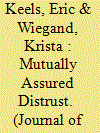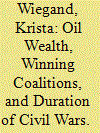| Srl | Item |
| 1 |
ID:
175347


|
|
|
|
|
| Summary/Abstract |
Within the study of intrastate armed conflicts, many scholars rely on a bargaining model when explaining why some civil wars are intractable. Primarily, scholars posit that commitment problems represent a key barrier to settling conflicts through negotiations. Yet, some civil wars are more easily resolved than others. If commitment problems are a universal feature of civil wars, what explains why commitment problems are more salient in some conflicts as compared to others? We argue that ideological differences between combatants enhance commitment problems in civil wars. Assuming that ideology is used by combatants to generate support, concessions that violate the ideological goals of each side may alienate supporters. With extreme ideological polarization, concessions may be viewed as relative as opposed to absolute, making it difficult for either side to credibly commit to offer concessions. To test these claims, we quantitatively examine the duration and outcome of all intrastate conflicts from 1975 to 2011.
|
|
|
|
|
|
|
|
|
|
|
|
|
|
|
|
| 2 |
ID:
165266


|
|
|
|
|
| Summary/Abstract |
New research has begun to underscore the complicated relationship between democratic institutions and the duration of civil wars. Specifically, greater constraints placed on executives often lead to considerably longer civil wars as leaders are limited in how they bargain with dissidents. This presents a puzzle as democracies are often seen as credible negotiators in international disputes. This article suggests that the size of the government’s winning coalition represents a double-edged sword. Larger winning coalitions allow governments to bargain more credibly but also place constraints on what governments can offer since peace agreements may alienate coalition members. Fortunately, future access to postwar oil wealth provides the feasibility for the governments to compensate hard-liners who may lose out on any settlement, making them more likely to allow concessions to rebels. This combined credibility of large winning coalitions and the feasibility provided by oil wealth allows for peace agreements, therefore shortening the duration of civil wars. We test these propositions by examining the conditional relationship between oil wealth and coalition size on the duration of all civil wars between 1950 and 2009.
|
|
|
|
|
|
|
|
|
|
|
|
|
|
|
|